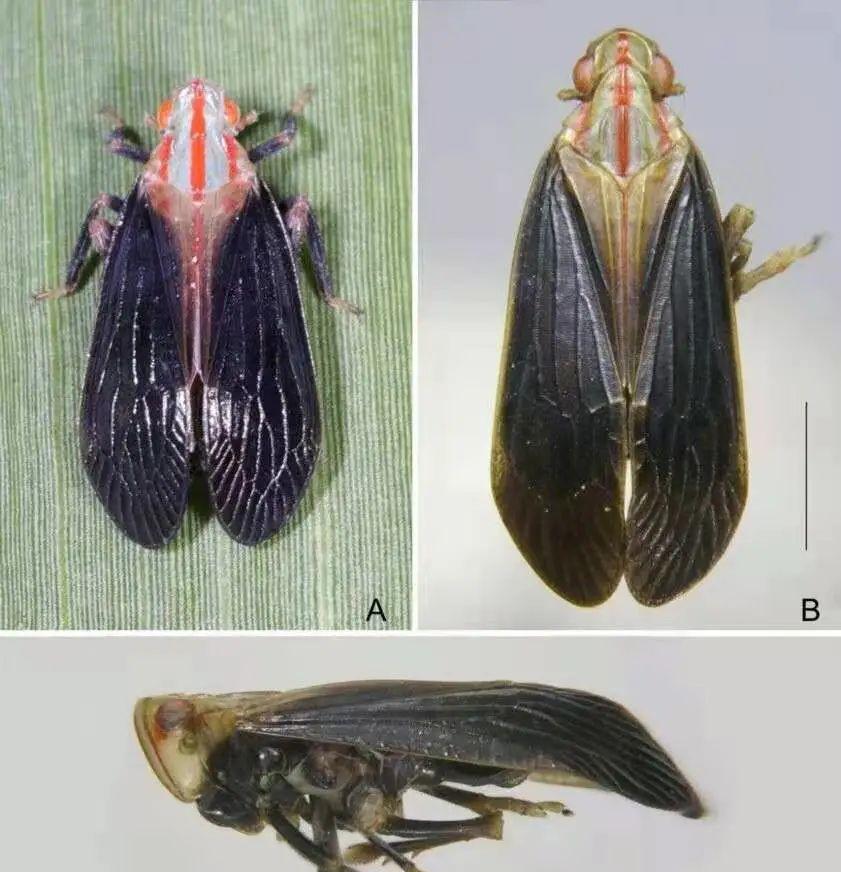Remember the "Jiang Ershi God Wax Cicada"? The wax cicada, which sleeps in Burmese amber and is nearly 100 million years old, is also the first new paleontological species in Jiangsu named after the school. Recently, the team of Dr. Song Zhishun, a young teacher of the Second Division of Jiangsu Province, who discovered the new species, has made a new discovery - Catullioides taishunensis.

Catullioides taishunensis sp. nov. A. Back view, ecological map; Back view; C. Side view.
"On the evening of August 28 last year, our scientific expedition team was sweeping nets at the collection point to collect insects. On a five-sectioned mango, I spotted a black insect. Due to the distance, I wasn't sure if it was a common beetle or some other insect, but as I slowly approached, I couldn't help but feel happy that it was really the taxon we had been studying for a long time, the flat wax cicada. In my memory, there was never a black flat wax cicada, which should be a good thing. Dr. Song Zhishun of the Institute of Insect Resources and Diversity of Jiangsu Second Normal University said in an interview with reporters that the research results he and his team have recently collaborated on were published in the international animal taxonomic journal ZooKeys, which has been recognized by the academic community.
Dr. Song Zhishun said that the research on wax cicada insects is not sufficient in China at present, and there are many new species to be discovered. Originally a monotypic genus, the genus was systematically revised after the team reviewed the model species at home and abroad, the red-banded flat wax cicada, and named the new species after the discovery "Taishun".
Dr. Song Zhishun of Jiangsu Second Normal University
The reporter noticed that this new species has a red and silver head, and the black wings at the hem are bright and powerful, like a "fighter" wearing a cape, with a cool wind. What is the role of discovering and studying these new insect species for ecological conservation? Song Zhishun explained that wax cicadas are plant-eating insects, that is, they rely on the sucking mouthparts to suck plant sap for a living, in this process, will seize plant nutrients, cause plant malnutrition, or cause wilting, or cause yellow-brown spots at the feeding site, and some also spread plant viruses, many of which are pests that harm agricultural and forestry plants. He said that adequate research on such insects can make humans more aware of them and master effective ways to control related pests and diseases.
Song Zhishun's investigation team has carried out insect field surveys in Shuntai, Zhejiang Province since last year, using a variety of means such as photo recording method, sweeping net method, lamp enticing method, trap method, etc., and strives to comprehensively, systematically and accurately assess the current situation of insect diversity in the area. After nearly a month of field work, Song Zhishun's investigation team obtained nearly 5,000 specimens of various types and more than 4,000 insect pictures. More than 300 insect species have been preliminarily compiled, and for the first time the world's smallest dragonfly has been found in Taishun: the pygmaea Rambur (Nannophya pygmaea Rambur, 1842).
Jiangsu Second Normal Students conduct field scientific expeditions
In June 2019, Song Zhishun, as the first author, published a paper in the internationally renowned journal of geology, Cretaceous Studies, and his team found two new unique wax cicadas in Burmese amber produced nearly 100 million years ago, which are different from any known taxons of the wax cicada family and represent a new family of wax cicadas, the Yetkhatidae. The species of this genus, "Jiang Er Shi Shen Wax Cicada Yetkhata Jiangershii", is named after the abbreviation "Jiang Er Shi" of Jiangsu Second Normal College.
Source: Nanjing Morning Post/Love Nanjing reporter Wang Jinghui
Edit: Lin Li